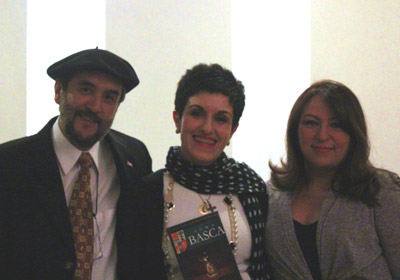basque heritage worldwide

09/09/2011

ADVERTISING
Sao Paulo, Brazil. The Itapevi Basque club celebrated its first Basque week from September 2-4, in hopes of calling attention to the Basque culture and its presence in Sao Paulo. The attorney Ana Luiza Etxaluz visited on this occasions and presented her book The Basque Soul to those in attendance. In this work, Etchaluz, who is Brazilian of Basque descent, narrates the process of discovering her origins as well as offering information on the Basque Country and its culture.
According to the author, there was Basque emigration to Brazil, but there are many Basque-Brazilians that are not aware of their Basque roots. Etchaluz’s book is one, and maybe the only one written in Portuguese, on the subject, as the author herself has said. Stemming from her book and the numerous interviews that she has done with local media, many people have contacted her to inquire about their genealogy, to the extent that she is behind the creation of an euskal etxea in the city where she resides, Porto Alegre. She is also counting on the advice and support of the Brazilian Basque club of Itapevi during this venture.
From Brazil to Bayonne
In an interview conducted at the beginning of the year with journalist Joxean Agirre, from Gara (the full interview in Basque here), Etchaluz talks about the process of the creation of the book: “I knew from a very young age that my father’s last name was Basque, but we didn’t have much information about the Basque Country. There are many people of Basque origin in the south of Brazil, most of which have come from Uruguay and Argentina. One of my father’s sisters talked a lot about our origin and my father imagined many times how the Etchaluz family must have come to Porto Alegre, but he didn’t have any records.” The family contacted some cousins in Buenos Aires, but we couldn’t continue the line through them.
Researching on the internet, Ana Luiza found the story of Christiane Etxaluz, a historic militant leftwing nationalist. Ana Luiza learned French and when she felt like she had mastered the language, in 2007, she called Christiane at her home in Bayonne. She then discovered that Etxaluz spoke Portuguese, since her husband, Alfonso Etxegarai, had been deported to the island of Sao Tomé (the couple’s story is told in the movie Sagarren Denbora, 'Apple Time').
With the collaboration of Etxaluz, Ana Luiza was able to construct her family’s tree and since then has visited Bayonne and the Basque Country on several occasions. Her adventure that she relates in The Basque Soul now serves as a stimulus for other Basque-Brazilians eager to deepen their knowledge of their families’ origins.
ADVERTISING
ADVERTISING
ADVERTISING
ADVERTISING
ADVERTISING
© 2014 - 2019 Basque Heritage Elkartea
Bera Bera 73
20009 Donostia / San Sebastián
Tel: (+34) 943 316170
Email: info@euskalkultura.eus